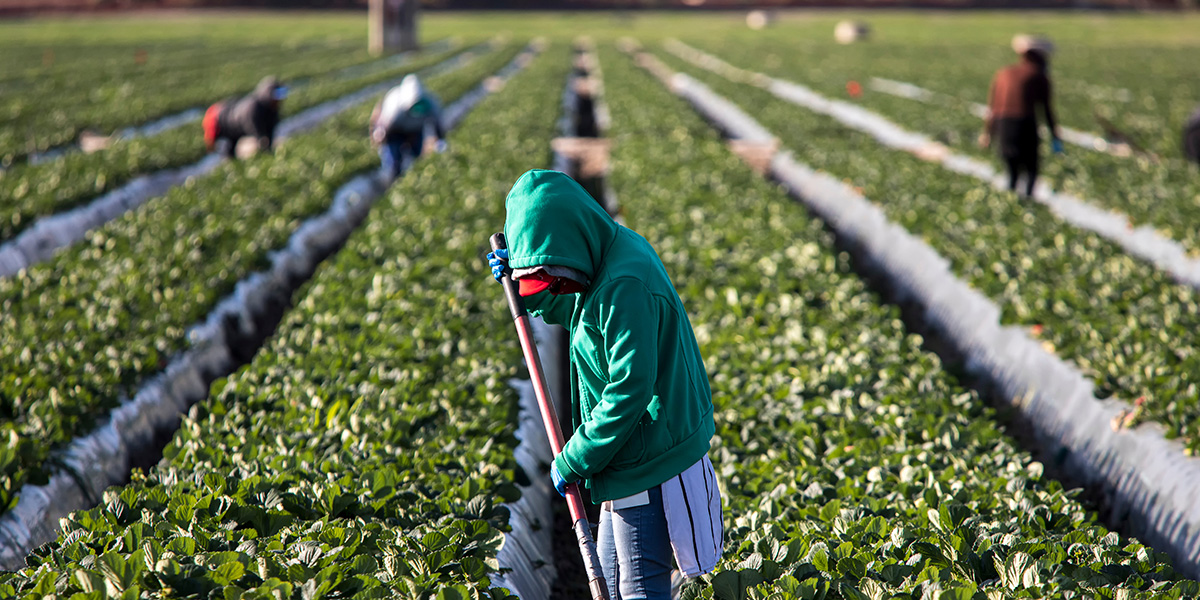Natalie Sedacca on the Seasonal Agricultural Workers’ Scheme: workers’ rights at risk
We talked to Natalie Sedacca, a lecturer in Law at Exeter a University, specialising in migrant and labour law, on how the end of free movement is increasing the risk of super-exploitation for migrant agricultural workers from the EU.

We know that one of the sectors that has benefited the most from Freedom of Movement so far has been the agricultural sector. What has the Home Office put in place to replace it when it comes to workers who won’t fulfill the stringent points system requirements?
In December 2020 the government announced an extension of the Seasonal Workers’ Pilot for the issuing of temporary visas to agricultural workers. The scheme permits an individual to work on a UK farm for a period of up to six months, after which they must leave the country for at least six months before applying to return again. The scheme was introduced to address a labour shortage as farmers found it more difficult to recruit EU nationals following the 2016 referendum, even before the formal end of free movement on 31 January 2020. Those recruited to work on farms under the visa scheme have reported being subjected to punitive productivity targets, meaning that if they do not work fast enough, they are prevented from working or earning money for the rest of the day, and employed on zero-hours contracts that fail to guarantee a minimum earnings level.
Why is this scheme bad news for workers’ rights?
There are strong indications that the poor conditions these workers experience is exacerbated by the visa conditions. Unlike free movement, these conditions do not allow workers to freely change employer, limiting them instead to finding new jobs within the farming industry and via the same agencies that brought them to the UK. Research on the scheme’s impact in Scotland, drawing on worker testimony that has been missing from the government’s assessment, found it to be associated with risks of forced labour and trafficking. Specific indicators identified included deception about the nature of work, ‘degrading living conditions’ in employer-provided housing, and a refusal of transfers to alternative employers. Recommendations to address these conditions include ensuring a choice of employment guaranteeing a minimum amount of work, removing the visa fee of £244, increasing labour market enforcement, and establishing a visa not reliant on sponsorship for those who have been subjected to abusive conditions.
You mentioned this was a pilot, but are there examples of similar restrictive visas already in place and how the Home Office has dealt with the problems arising?
The emerging evidence that this visa scheme creates vulnerability to exploitation chimes with a broader pattern of short term, non-renewable visas making workers more vulnerable to exploitation for various reasons, including the greater difficulty of joining a union. Parallels can also be drawn with a longer established restrictive scheme for non-EU workers, the Overseas Domestic Worker scheme: changes since 2012 have encouraged dependency by allowing stays of only six months except in very limited circumstances. While the formal tie to the employer was removed in 2016, without a route to extend the visa beyond six months this change has been inadequate to address problems as it is very difficult for workers to find a new role with only weeks or months remaining on their visa.
Freedom of movement also didn’t prevent abuse of labour law though, did it? Why is the Government’s approach here so much worse?
The government’s decision to limit visas to a six month period, and reference to its ‘long history of helping farmers and growers get the seasonal workers they need,’ are symptomatic of treating workers as commodities, here to deliver for farmers and consumers and leave once their time is up, rather than people with their own complex lives and needs. Those who overstay the six month limit will become undocumented, lacking the right to live or work in the country, and subject to the hostile environment. Free movement was far from a perfect system for workers in a context of the UK government’s wholly inadequate enforcement of labour law standards. However, the position of workers is very significantly worsened by its replacement with the Seasonal Workers’ visa scheme.
April 20, 2021
Brexit Spotlight is run by Another Europe Is Possible. You can support this work by joining us today. The website is a resource to encourage debate and discussion. Published opinions do not necessarily represent those of Another Europe.





